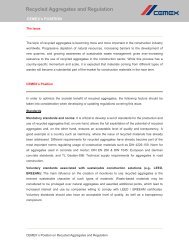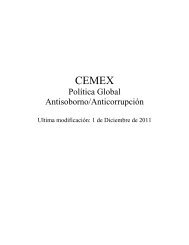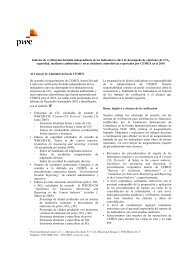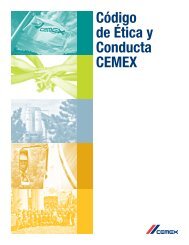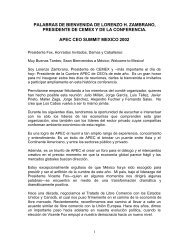building a STRONGER foundation - Cemex
building a STRONGER foundation - Cemex
building a STRONGER foundation - Cemex
You also want an ePaper? Increase the reach of your titles
YUMPU automatically turns print PDFs into web optimized ePapers that Google loves.
Additional Consolidation Taxes arising after 2004 will be taken into account in the sixth fiscal year after their occurrence and<br />
will be payable over the succeeding five years in the same proportions (25%, 25%, 20%, 15% and 15%). Applicable taxes payable as a<br />
result of this tax reform will be increased by inflation adjustments as required by Mexican Income Tax Law (Ley del Impuesto Sobre<br />
la Renta). In connection with the changes in the tax consolidation regime in Mexico, as of December 31, 2009, we recognized a<br />
liability of approximately Ps10.5 billion (U.S.$799 million), of which approximately Ps8.2 billion (U.S.$628 million) were recognized<br />
under “Other non-current assets” in connection with the net liability recognized before the new tax law and that we expect to realize in<br />
connection with the payment of this tax liability; and approximately Ps2.2 billion (U.S.$171 million) were recognized under “Retained<br />
earnings,” considering special provisions under MFRS, for the portion, according to the new law, related to: (a) the difference between<br />
the sum of the equity of the controlled entities for tax purposes and the equity for tax purposes of the consolidated entity; (b) dividends<br />
from the controlled entities for tax purposes to CEMEX, S.A.B. de C.V.; and (c) other transactions among the companies included in<br />
the tax consolidation that represented the transfer of resources within such group. In December 2010, the tax authority in Mexico<br />
granted us the option to defer the calculation and payment of income taxes, until a subsidiary is disposed of or until CEMEX<br />
eliminates the tax consolidation, over the difference between the sum of the equity of the controlled entities for tax purposes and the<br />
equity of the consolidated entity for tax purposes. As a result, CEMEX reduced its estimated taxes payable by approximately Ps2,911<br />
million against a credit to “Retained earnings.” In our U.S. GAAP reconciliation of our 2010 and 2009 financial statements, the<br />
approximately income of Ps2.9 billion (U.S.$236 million) and expense of Ps2.2 billion (U.S.$171 million), respectively, recognized<br />
under “Retained earnings” under MFRS were reclassified under U.S. GAAP to income tax revenue for the period in 2010 and income<br />
tax expense for the period in 2009.<br />
As of December 31, 2010, our estimated payment schedule of remaining taxes payable resulting from changes in the tax<br />
consolidation regime was as follows: approximately Ps501 million in 2011, approximately Ps667 million in 2012, approximately<br />
Ps667 million in 2013, approximately Ps1.9 billion in 2014 and approximately Ps6.3 billion in 2015 and thereafter. For the year ended<br />
December 31, 2010, we paid Ps325 million (U.S.$26 million) in respect of Additional Consolidated Taxes. See notes 2N and 15A to<br />
our consolidated financial statements included elsewhere in this annual report.<br />
On February 15, 2010, we filed a constitutional challenge (juicio de amparo) against this tax reform. However, we cannot assure<br />
you that we will prevail in this constitutional challenge.<br />
It may be difficult to enforce civil liabilities against us or our directors, executive officers and controlling persons.<br />
We are a publicly traded stock corporation with variable capital (sociedad anónima bursátil de capital variable) organized<br />
under the laws of Mexico. Substantially all of our directors and officers and some of the persons named in this annual report reside in<br />
Mexico, and all or a significant portion of the assets of those persons may be, and the majority of our assets are, located outside the<br />
United States. As a result, it may not be possible for you to effect service of process within the United States upon such persons or to<br />
enforce against them or against us in U.S. courts judgments predicated upon the civil liability provisions of the federal securities laws<br />
of the United States. We have been advised by our General Counsel, Lic. Ramiro G. Villarreal, that there is doubt as to the<br />
enforceability in Mexico, either in original actions or in actions for enforcement of judgments of U.S. courts, of civil liabilities<br />
predicated on the U.S. federal securities laws.<br />
The protections afforded to non-controlling shareholders in Mexico are different from those in the United States and may be<br />
more difficult to enforce.<br />
Under Mexican law, the protections afforded to non-controlling shareholders are different from those in the United States. In<br />
particular, the legal framework and case law pertaining to disputes between shareholders and us, our directors, our officers or our<br />
controlling shareholders, if any, are less developed under Mexican law than under United States law, generally only permits<br />
shareholder derivative suits (i.e., suits for our benefit as opposed to the direct benefit of our shareholders) and there are different<br />
procedural requirements for bringing shareholder lawsuits, such as shareholder derivative suits, which differ from those you may be<br />
familiar with under U.S. and other laws. There is also a substantially less active plaintiffs’ bar dedicated to the enforcement of<br />
shareholders’ rights in Mexico than in the United States. As a result, in practice it may be more difficult for our non-controlling<br />
shareholders to enforce their rights against us or our directors or controlling shareholders than it would be for shareholders of a United<br />
States company.<br />
ADS holders may only vote the Series B shares represented by the CPOs deposited with the ADS depositary through the ADS<br />
depositary and are not entitled to vote the Series A shares represented by the CPOs deposited with the ADS depositary or to attend<br />
shareholders’ meetings.<br />
Under the terms of the ADSs and our by-laws, a holder of an ADS has the right to instruct the ADS depositary to exercise<br />
voting rights only with respect to Series B shares represented by the CPOs deposited with the depositary, but not with respect to the<br />
Series A shares represented by the CPOs deposited with the depositary. ADS holders will not be able to directly exercise their right to<br />
vote unless they withdraw the CPOs underlying their ADSs (and, in the case of non-Mexican holders, even if they do so, they may not<br />
vote the Series A shares represented by the CPOs) and may not receive voting materials in time to ensure that they are able to instruct<br />
18



